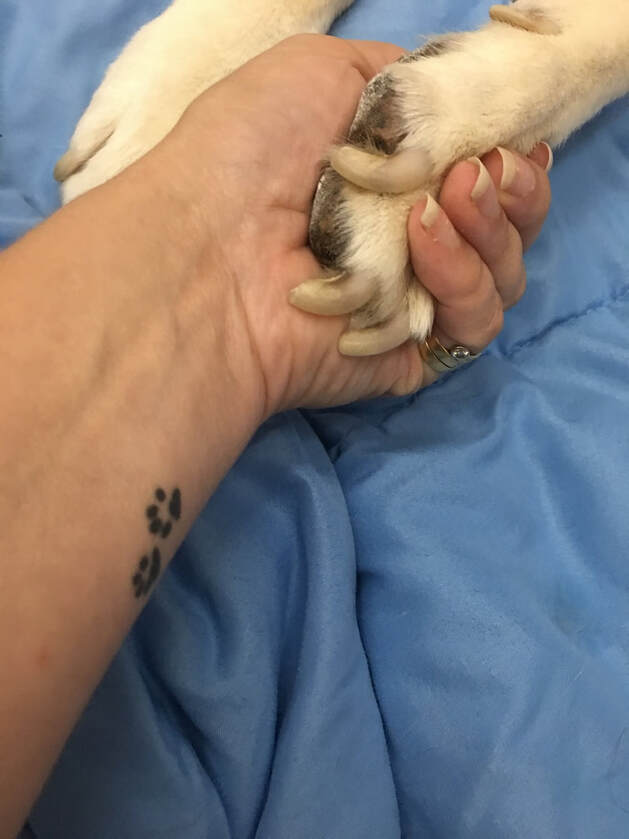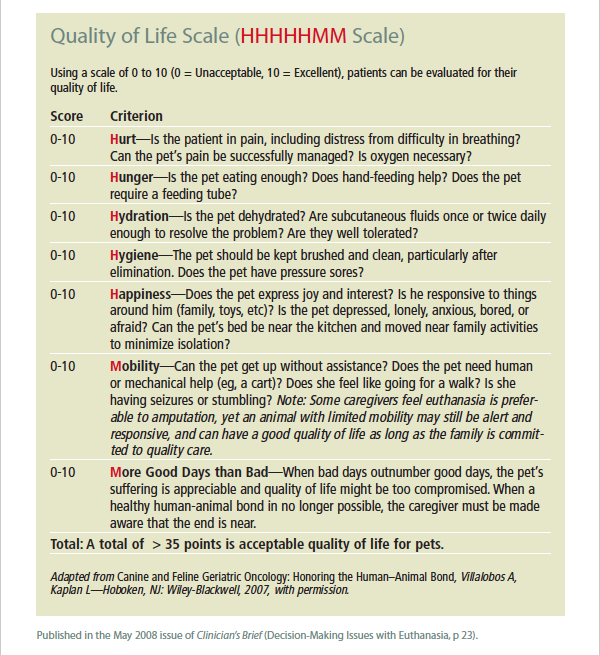|
The loss of a beloved pet can be the deepest heartbreak of our lives. With each article, we will address and answer a key topic with Certified Pet Grief Counselor, Pina De Rosa (APLB / AAVSB). If you wish to send in questions for Pina, please submit them to Pina De Rosa through www.PetBereavementCounseling.com In our last topic on Pet Grief Counseling, we looked at the four different degrees of bonding with our pets, as well as what is different when an older pet owner is grief stricken, especially a single pet owner. With this topic, we get to look at the impact of the complexity of euthanasia and how to cope with the guilt that is so common after euthanizing a pet. Guilt is so common after euthanizing a pet because it can be extremely difficult to separate the harrowing heartbreak from the honorable decision. Euthanasia involves intense conflicting emotions. Even when the pet owner understands that euthanasia is a much-needed decision and humane way to deal with their pet’s degenerating quality of life, it is often one of the most painful and guilt-ridden experiences that the owner will ever endure. That guilt they feel is their heartbreaking grief trying to come out somehow. While the pet owner often gets the concept that euthanasia frees their pet from terminal suffering, it is also one of the most distressing actions they will need to take. Eventually they learn to live with that choice as one of the most selfless, honorable and loving actions they could ever take. Unfortunately, pet owners are not always educated about it ahead of time. Although they understand that euthanasia is part of their responsibilities as a pet owner, it is often only a fleeting abstraction. The lesser they know about euthanasia ahead of time, the more guilt they are likely to feel when euthanizing their beloved companion. Hence some pet owners will often question if they acted too soon, even wishing that things had been done in different ways. And some pet owners will wonder if they waited too long, often regretting delaying acting sooner. That tormenting second guessing they feel is inevitable at first, which is why the bereft owner needs to be gently reminded that the decision was taken away from them by the incurable disease. A continued sense of that unmerited guilt will only worsen their tormenting confusion and distress. Ultimately this experience is part of that unspoken covenant that pet owners have with their beloved companions. Some people are very distraught after euthanizing their pets because they will question their judgment. Remorse will have them second guess if what was done was the right course of action, wondering if they acted too soon or if they waited too long. Aside from 1-1 pet grief counseling, I would recommend these different kind of resources: “The Loss of a Pet” by Dr Wallace Sife – amongst the numerous books I have read on the subject, this book is, hands down, the best reading resource guide. Truly a priceless supplemental help to the 1-1 counseling. By far! If your friend has lost a beloved pet, I strongly consider buying this for them. Pet grief support groups in your area - I would recommend these support group sessions as a way for the bereft pet ownerss to share their feeling as well as hear from others who are having similar painful experiences. This will help them feel not alone in their grief. The sharing of the heartwarming memories of their pet will also assist in their healing. That said, if they might not be able to drive to a group, but would still like the benefit of a community experience, I would recommend a dedicated Chat Room, such as the www.APLB.org Chat Rooms. The www.APLB.org - I would recommend the Association of Pet Loss and Bereavement website to the bereaved pet parent for several reasons. The Pet Heaven web page and the In Memoriam web pages can offer a sense of comfort, even for those who may not believe in religion or afterlife. Lastly, if the client is distraught after euthanizing their pet due to bloody visual memories that may haunt them and cause them to experience a shock similar to PTSD, I would work with them on progressively attenuating that intensity. If those gory flashbacks persist even beyond the scope of our sessions together, I would then refer them to a licensed psychotherapist as supplemental help to the counseling. After euthanizing a beloved pet most clients will feel emotionally wasted, and stunned, and their lives are in a turmoil. Aside from the guilt aspects which we have already addressed, above, I would counsel this euthanasia remorse through the compassionate reminder that the decision was no longer theirs. I would gently reassure them that it was keeping them out of pain was their responsibility and an act of love. I would emphasize that it was the terminal illness that actually killed their beloved companion. Nothing else. I would reassure them that it was a most courageous act, and their honorable duty to help end their suffering. I would acknowledge them for how generous they were in putting aside their own emotions for the sake of their beloved companion. I would let them know that while the emotional strain they feel is absolutely normal, it is important to cry and let it out because tears are healing. I would remind them that the only way out of that pain is to go through it. I would counsel them to gently start accepting the grief that comes with the terrible heartbreak of euthanasia. I may also recommend, if they haven’t already, to write two letters to and from their pet. I would counsel them with specific writing prompts so as to express those heartfelt thoughts and feelings on paper. Writing under specific writing prompts contributes to the healing as well as provides a sense of perspective. It would allow them to gently start looking for ways to create a meaningful perspective as a gateway to moving towards resolution and honoring their companion’s wonderful life. That said, there are special circumstances when it would be not good to euthanize a pet. It would not be good to euthanize a pet when it is a decision made out of convenience and when it is a decision that would be as easy for the owner as discarding a pair of old shoes. For example, some owners have no problem euthanizing healthy pets such as if a cat may scuff the any part of the house, or if the pup may dirty the house, or if a dog may bark excessively. Usually these are weakly bonded owners who would do it simply not to be inconvenienced. It would not be good, it would be in fact immoral, to euthanize a pet for such reasons. Euthanasia is a decision to be made out of mercy when a pet is terminally ill. That said, it would not be good to euthanize the pet if the pet has more good days than bad ones. It would also not be good if the pet is not suffering of a terminal disease. It is a judgment call that needs sacrifice and bravery – a decision that ultimately is up to the pet owner alone, without pressure from others’ opinions. Dr. Alice’s Villalobos’ Universal HHHHHMM scale will be very helpful in such circumstances, as it helps pet owners making this most challenging decision at the right time. Yet another bad reason to euthanize a pet is when there are times owners simply no longer want to be responsible for vet costs. That is not a good reason to euthanize a pet, especially if the animal is not in excruciating pain, is able to enjoy life and carry out normal body functions. Also, if the pet can experience a peaceful and painless death naturally at home, it would not be good to euthanize them. Ultimately, if the pet’s health, their disposition and their owner’s preferences are not being taken into consideration, it would not be good to euthanize a pet until the owner can find a veterinarian who will do the procedure the way they prefer it. The pet owner needs to remain informed, fully responsible and in charge, even during such emotional time. And, there are a few reasons why “heroic measures” to save a terminally ill pet may not be advised. Those are practical reasons, ethical reasons and psychological reasons. a. Practical reasons - As overwhelming as it may feel, euthanasia maybe the only humane answer to handle a pet’s declining quality of life, such as when he turns violent and dangerous. Another practical reason might be the financial burden if that additional financial and emotional expense would only briefly prolong the pet’s life. It would be putting the pet through extra painful procedures or surgeries, without changing the outcome when there is no cure. Ethical reasons - The majority of pet owners do not want to see their pet suffer any extended pain or added stresses. Because most pet owners are honor-bound, ethical reasons usually make more sense and are often more easily accepted. Pet owners can eventually see that the mercy of the euthanasia process affords their beloved animals the chance to die with dignity and peace. Psychological reasons – The pet owner’s selfish preoccupation with how they feel is something they need to have the fortitude to put aside for the sake of their beloved companion. Regardless of his/her own personal discomfort with the need for euthanasia, it would not be advised to delay the process. The owner has to muster the courage to choose euthanasia in the interest of their pet, and do so timely. This will likely thrust into a deep existential growth and ultimately, with the proper pet bereavement counseling, yielding a wiser version of who they were. b. Just keeping a pet alive is not enough because radical behavioral shifts can occur in the pet, which can be noticeably upsetting and even dangerous to themselves as well as the owner(s). What is happening to the pet’s quality of life at this time is the decline and deterioration of the brain cells, which can cause biting, hostility, loud vocalizations and even a shift in their neurochemical balance. Though we think medication can help, often times it negatively impacts the pet’s quality of life by diminishing their senses. This can be bad because it can cause new emotional trauma as well as behavioral problems making their condition only worse. They degenerate to becoming a shell of themselves. Our pets completely trust us with their lives, their safety and well-being even when they have an incurable disease. Because euthanasia is a most selfless and courageous action for the sake of our pet, because it had to be this way, guilt has no place (and no logic) in that most honorable decision. Ultimately, we may need to gently be reminded that it is the terminal disease that is taking away the decision, often making euthanasia the only merciful recourse to save our beloved companion from any pain they feel. It is the most loving act of mercy, and there should be no guilt for that. That acceptance will ease their transition through the stages of grief allowing them to start their path towards healing and letting go of their pain, anguish and any unmerited guilt. As they start to heal, they can learn to live with their emotional wounds and focus their energies towards the heartwarming memories.
2 Comments
6/22/2021 11:28:16 am
I like the tip about making sure that your decision to euthanize a pet is based on love. My cat is 17 years old and she has a difficult time moving and is also suffering from cancer. I think that at-home euthanasia is the best decision for her so she can be at home for the final moments of her life.
Reply
9/23/2022 10:40:38 pm
It's great that you elaborated that it is harmful to pets and owners to let their pets live in a different way. My younger cousin informed me yesterday that she couldn't stand to see her pet suffer to live because of her condition, and she asked if I had any thoughts on what would be the best option to consider to give respect. I'm thankful for this informative article, I'll tell her that it will be much better if we consult a pet euthanasia service for her pet to rest peacefully.
Reply
Leave a Reply. |
A blog for conscious pet parents: Archives |




 RSS Feed
RSS Feed
